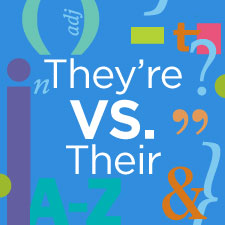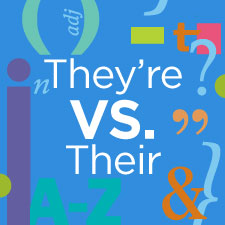9 Grammar Mistakes You Can Stop Making Today
by Commonwealth Financial Network
 Grammar . . . for many, it’s a dirty word that evokes painful memories of sentence diagrams full of gerunds, present participles, and predicate nominative case. (This even makes me cringe, and I have made correcting grammar mistakes my living.) But it doesn’t have to be as complicated as we often make it out to be.
Grammar . . . for many, it’s a dirty word that evokes painful memories of sentence diagrams full of gerunds, present participles, and predicate nominative case. (This even makes me cringe, and I have made correcting grammar mistakes my living.) But it doesn’t have to be as complicated as we often make it out to be.
I’ve been an editor for more than 15 years—and the keeper of Commonwealth’s house style for more than 13—and I can honestly say that I’ve seen it all, from run-on sentences, to misspellings, to agreement issues, and more. Each mistake, on its own, can lessen the impact of an otherwise well-written e-mail or paper; in the aggregate, such mistakes can damage your credibility as an expert in your field.
The good news is that there are specific rules you can memorize and refer back to in an effort to make your e-mails, website, and social media posts easier to read and understand. So, here, in no particular order, are nine grammar mistakes I frequently encounter, along with tips for how you can stop making them today.
Words that take a singular verb. Everyone knows that singular subjects take a singular verb and plural subjects take a plural verb. But there are other words that aren’t always as clear-cut. The following words, for instance, always take a singular verb. Memorize them!
| Anybody | Each | Everyone | Nobody | Somebody |
| Anyone | Either | Everything | None | Someone |
| Anything | Everybody | Neither | No one | Something |
He or she vs. they. This is a particular pet peeve of mine. Although it is considered acceptable in some circles to use a plural pronoun to refer back to a singular noun, it’s not okay in my style book. Here’s an example borrowed from our own post on student loan debt:
- The income-contingent repayment plan determines the payment based on income, even if a borrower’s income doesn’t qualify him or her for a partial financial hardship.
In this sentence, we’ve used a singular noun (“borrower”); we’ve also correctly used “him or her” to refer back to this noun, since we don’t know who this person is and we want to be gender neutral. This is fine in limited usage, but it can be awkward if you overuse “he or she” or “him or her” to refer back to your original noun.
This is why I generally recommend and practice rewriting similar sentences to use the plural and thus avoid the issue altogether:
- The income-contingent repayment plan determines the payment based on income, even if borrowers’ income doesn’t qualify them for a partial financial hardship.
They vs. it. Similarly, a company or an entity (like FINRA) is an “it” not a “they.”
- Incorrect: FINRA requires advisors to retain records for x years. They also recommend logging all conversations in a CRM system.
- Correct: FINRA requires advisors to retain records for x years. It also recommends logging all conversations in a CRM system.
Notice that in the first (incorrect) option, you end up with an inconsistency in verb usage: one sentence has a singular verb, the other a plural, when both are referring to the same entity.
Generally speaking, if you say your sentence out loud, any natural pause you make is an indication that you should insert a comma. Still, there are a few rules you may want to follow.
The Oxford (or serial) comma. This is the comma that comes before the final “or” or “and” in a list of items. Though book publishers still favor it, journalists avoid it like the plague. In my opinion, using it can add clarity to a sentence. Here’s an example I borrowed from Grammar Girl that I like to use in internal training classes:
- Rebecca was proud of her new muffin recipes: blueberry, peanut butter and chocolate chip and coconut.
As you can see, it’s unclear whether the final recipe is peanut butter and chocolate chip or chocolate chip and coconut. The serial comma would solve the problem. If you decide you want to use this comma, be sure to use it all the time, not just when you feel like it.
Coordinating conjunctions. These are the words “for,” “and,” “nor,” “but,” “or,” “yet,” and “so.” When any one of them is used to combine two independent clauses (i.e., two full sentences, each with a subject and a verb), use a comma before the conjunction. Otherwise, the comma really isn’t needed. Here are two versions of the same sentence:
- He was accepted at two universities, but he couldn’t decide which school to attend.
- He was accepted at two universities but couldn't decide which school to attend.
In the second example, there is no subject in the second half of the sentence, so the comma should be omitted. If, like many, you always find yourself inserting a comma in these situations, add a subject to the second phrase to make the comma usage correct.
Introductory words/phrases. I am a bit old school in this regard—I’ve seen style guides that have suggested this usage can be eliminated—but I prefer seeing a comma after an introductory word or phrase. Again, if you speak your sentence aloud, you’ll have a tendency to pause after that word or phrase, which is a sign that you can insert a comma. Here are a couple of examples:
- After receiving a phone call, Hannah ran from the room.
- On Tuesday, he has an appointment with an auto mechanic.
A dangling modifier is usually a phrase at the beginning of a sentence that doesn’t agree with the subject of a sentence. Here’s one of my favorite examples:
- Singing “Amazing Grace” from the choir loft, his lost German shepherd raced through the church as Joel looked on in disbelief.
Who’s doing the singing here? It sure isn’t the German shepherd, which is what the sentence implies.
One way to fix these types of sentences is to move the subject of the sentence closer to the modifying phrase:
- Singing “Amazing Grace” from the choir loft, Joel looked on in disbelief as his lost German shepherd raced through the church.
An apostrophe has two functions, depending on the context of the sentence: It can be used to show possession, or it can stand for a missing letter.
The words “it’s” and “its” are a special case, as “it’s” is the contraction for “it is,” which makes “its” the possessive pronoun. The only way to get this one right is to memorize it.
Similarly, “you’re” is the contraction for “you are” and “they’re” for “they are”; again, the apostrophe signals a missing letter, while possession is shown via the words “your” and “their.” Of course, the homophone “there” can also muddy the waters.
Given how often I see errors in usage, I can’t stress enough how important it is to proofread your own work (or have someone else give it a second look) before considering it final. Unfortunately, Microsoft’s grammar check generally will not help you here; in fact, it told me my use of “their” in the paragraph above is wrong. (More on this below.)
When we use a pronoun to refer to ourselves and it appears in the subject of the sentence, we, of course, use “I.” When the pronoun comes in the predicate, we use “me.” But things often go awry when another person is added to the sentence. For example:
- My mom and ?? love to read.
- He sent the final article to Compliance and ?? for approval.
Do you know the correct pronoun to use? There’s an easy trick: Cover up the other person’s name and “and” to see what fits:
- My mom and I love to read.
- He sent the final article to Compliance and me for approval.
More and more, I’m seeing “impact” used as a replacement for the verb “affect.” We’ve been guilty of it here at Commonwealth, too. Merriam-Webster seems to recognize this usage as correct, though grammarians may call you out on it. Still, if you gravitate toward “impact” because you don’t know the difference between “affect” and “effect,” take note.
Generally, “affect” is a verb meaning “to influence,” and “effect” is a noun meaning “consequence” or “result”:
- The fund was affected by the sector’s performance.
- The sales idea produced the right effect.
"Effect" can be a verb as well. It means "to bring about" and might be used as follows:
- To effect a transfer of funds, clients should call their advisors.
Here, again, I use a more traditional approach, preferring to see “more than” when referring to a quantifiable item and “over” when referring to spatial relationships. For example:
- The index was up more than 3 percent at quarter-end.
- The horse jumped over the creek.
“Less” is typically used to refer to general quantity and “fewer” to things that can be counted:
- Fewer than 200,000 people live in the city.
- She decided to contribute less money to her IRA this year.
Don’t use “while” when you really mean “although,” especially at the beginning of a sentence. “While” refers to time, whereas “although” means “in spite of the fact that.” Here’s the correct usage of while and an example of where “although” should be used instead:
- While Susan fixed dinner, the kids played video games in the living room.
- This is correct because these events are happening at the same time.
- While the snowstorm created blizzard conditions, there were no major accidents.
- This is incorrect, as the sentence is conveying that there were no accidents in spite of the fact that there were hazardous conditions.
I have three words for you: Don’t believe it! No offense intended to Microsoft, but a computer program simply cannot understand a complex sentence. Among the more frequent errors the grammar check introduces is the suggestion to use “you’re” for “your” and vice versa. Although I appreciate that my writers use spell/grammar check before sending me their work, I can tell when they’ve relied on the grammar check: as soon as I correct an obvious error, Microsoft flags it!
You don’t need to turn off this function—in fact, it can provide a good means for double-checking your work—just don’t blindly agree with what it tells you.
The words you use to communicate have the power to convey something about your personality or the way you do business. When you take the time to correct even small errors in punctuation and word usage, you tell your readers that you care about them—and your own credibility. The next time you compose an e-mail, before hitting Send, be sure to take a few extra minutes to read through your work to see if you’ve made any of these common grammar mistakes. Your recipients will thank you for your attention to detail.
Do you have other questions about grammar? Is there something missing from this list you’ve always wanted to know? Ask me below.
Commonwealth Financial Network is the nation’s largest privately held independent broker/dealer-RIA. This post originally appeared on Commonwealth Independent Advisor, the firm’s corporate blog.
Copyright © Commonwealth Financial Network
















